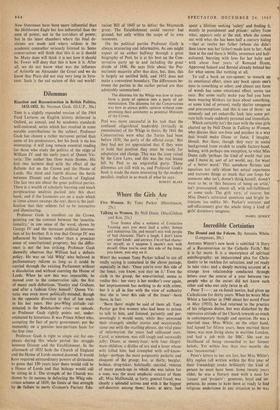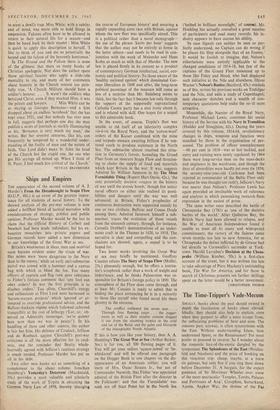Incredible Certainties
The Hound and the Falcon. By Antonia White. (Longmans, 30s.)
ANTONIA WHITE'S new book is subtitled 'A Story. of a Reconversion to the Catholic Faith.' But it is far more. It is a masterpiece of spiritual autobiography; an impassioned plea for Chris- tianity to be reckless for salvation, and yet ready to take risks; and a deeply moving account of a strange love relationship conducted through letters over the course of a year between two people who at the outset did not know each other and who met only twice in all.
Peter T—, an ex-Jesuit novice, had given up Catholicism for thirty years. When he wrote Miss White a fan-letter in 1940 about her novel Frost in May (1933), he had returned to the practice of his religious duties, but was disturbed by the repressive attitude of the Church towards so much in contemporary thought and opinion. He was a married man. Miss White, on the other hand, had lapsed for fifteen years, been married three times, was now living alone in wartime London, and had a job with the BBC. She saw no likelihood of being reconciled to her former beliefs. Yet within less than two months she was 'reconverted.'
Peter's letters to her are lost, but Miss White's fifty replies (all written within the first year of their friendship) evoke brilliantly the kind of person he must have been. Some twenty years older, he was a literary man with a nose for `causes' and 'projects': generous, loyal and im- petuous, he seems to have been as ready to find religious undertones in any situation as he was
to scent a devil's trap. Miss White, with a subtler, cast of mind, was more able to hold things in suspension. Falcons often have to be allowed to return to their natural life for a season—and then be lured back by their master ; Miss White is quick to apply this description to herself. 'I like to think of you and rine as potentially the hound and the falcon of the heavenly huntsman.'
In The Hound and the Falcon there is none of the glibness that mars so many books of Christian apologetic. Nor does the author spare those spiritual fascists who apply a slide-rule mentality to sin, and many of her comments about honesty in the Church remain too pain- fully true. 'A Church Militant should 'have a soldier's honour. . . . It wasn't the soldiers who betrayed Christ, even if they mocked Him; it was the priests and lawyers. . . .' Miss White can be as slaying as Georges Bernanos—and a hint dropped about an endless 'notebook' that she has kept since 1921, and that nobody has ever seen in full, suggests that perhaps one day she may publish a series of journals as starkly illuminating as his. 'Bernanos is very much my man,' she writes. But her severest censures, like his, can frequently be tempered by a wonderful under- standing of the frailty of man and the nature of faith. 'Our Lord didn't make St. John the head of the Church but the stupid one, the one who got His sayings all mixed up. When I think of St. Peter, I feel much less critical of the Church.'
NEVILLE BRAYBROOKE































 Previous page
Previous page